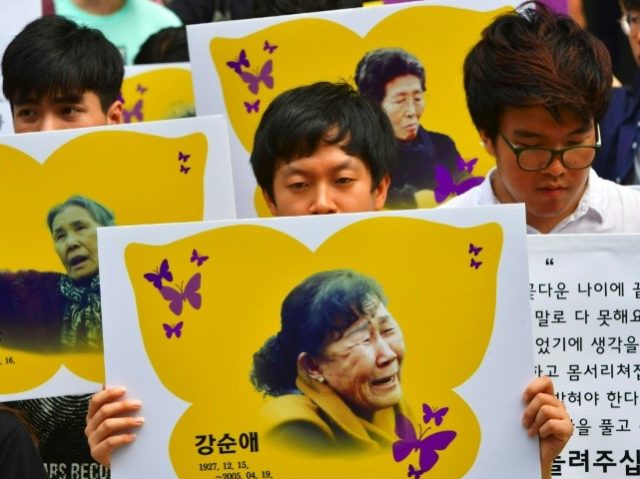South Korea announced on Wednesday that it will dissolve the “Reconciliation and Healing Foundation,” established by a 2015 agreement with Japan to help the families of “comfort women” abused by Japanese soldiers during the World War II era.
Japan, which provided about $9 million in funding for the foundation, reacted angrily to the decision and said it would damage the relationship between Tokyo and Seoul.
The Japanese are upset with the announcement because they believed the 2015 agreement settled the issue of comfort women and sexual slavery during the occupation of Korea. Many South Koreans thought the deal whitewashed the offenses of Imperial Japan. Others criticized South Korean negotiators for accepting too small of a settlement and failing to properly consult with the victims and their families. Meanwhile, the Japanese have been constantly apprehensive about the agreement falling apart.
The Associated Press on Wednesday noted the reconciliation deal was one of several stress points between Tokyo and Seoul:
South Korea and Japan are already at odds over a ruling by Seoul’s Supreme Court last month that a major Japanese steelmaker should compensate four South Koreans for forced labor during Japan’s colonial rule of the Korean Peninsula before the end of World War II. Abe said Tokyo will respond “resolutely” to the ruling, which he described as a violation of a 1965 treaty between Seoul and Tokyo that restored diplomatic ties and was accompanied by more than $800 million in economic aid and loans from Tokyo to Seoul.
Seoul and Tokyo’s bitter disputes over history have complicated Washington’s efforts to strengthen trilateral cooperation to deal with North Korea’s nuclear threat and China’s growing influence in the region.
At the time of the sex slave deal, Seoul said there were 46 surviving South Korean victims. But 19 of them since died. Twelve victims who rejected payment from the foundation sued the Seoul government over the deal in August 2016, saying it didn’t go far enough to establish Japan’s responsibility.
The South Korean Ministry of Gender Equality and Family announced the dissolution of the foundation “based on victim-centric principles” and said it would work to “restore the honor and dignity” of sexual slavery victims. Dissolution of the foundation is expected to take six months to a year, during which time the two governments will discuss the disposition of unused funds provided by Japan.
South Korean activists were pleased with the ministry’s announcement:
The decision was welcomed by hundreds of protesters gathered in Seoul for a weekly rally denouncing sexual slavery by Japan’s wartime military. Organizers played a recorded message by a hospitalized 92-year-old victim, Kim Bok-dong, who said she was happy that the foundation was getting dissolved but also demanded a proper apology and compensation from Tokyo.
“We won, (but) it’s just the start,” said Yoon Meehyang, who heads an activist group representing South Korean sexual slavery victims. “In saying that we won, we mean that we turned back history to the day before Dec. 28, 2015. We will invest all our passion to write a new history of justice while the victims still have time and overcome past three years that were lost.”
Japanese Foreign Minister Taro Kono said the announcement was “problematic and unacceptable” and violated “the most basic rule to live in the international society.” The South Korean ambassador was summoned to receive a formal protest.
Kono noted that most of the comfort women alive at the time of the 2015 agreement received funds from the foundation, as did the families of 58 out of 199 who had already died. He said the beneficiaries of the foundation gave it “high ratings,” as did “international society.”
Japanese Prime Minister Shinzo Abe urged South Korea to stick with the 2015 deal in a press conference on Wednesday.
“Relationships between a country and another cannot come into existence unless each of them keeps their promises. I would like to ask South Korea to behave in a responsible manner,” he said.
The Associated Press reported this week on continuing disagreements over the comfort women issue in Japan, including controversial assertions by a journalist close to Prime Minister Abe that many of the women were willing prostitutes rather than forced into sexual slavery.
Some Japanese feel there is a shortage of convincing documentary evidence the comfort women were forced into slavery, and while they might still see Imperial Japan’s behavior as reprehensible, they believe sufficient reparations and apologies have been made. They fear the old wounds will be reopened in the #MeToo era and Japan will be unreasonably humiliated for the actions of the past. The issue is a fault line between the Japanese left and right that could generate a political earthquake as the Japanese public reacts to South Korea’s apparent nullification of the 2015 agreement.

COMMENTS
Please let us know if you're having issues with commenting.